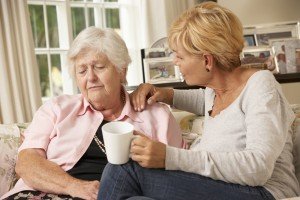Our Blog
Hospital Delirium: The Little Known Danger for Seniors
 As difficult as a hospital stay may be, we’re at least somewhat comforted by the fact that we’re in the right place where we’re going to get the help we need to be healed or to get well. Or are we? For seniors in particular, a surprising effect of hospital stays is becoming more and more prevalent: hospital delirium.
As difficult as a hospital stay may be, we’re at least somewhat comforted by the fact that we’re in the right place where we’re going to get the help we need to be healed or to get well. Or are we? For seniors in particular, a surprising effect of hospital stays is becoming more and more prevalent: hospital delirium.
Termed “ICU psychosis” by geriatrician Sharon Inouye of Harvard Medical School, hospital delirium is both “underrecognized and underdiagnosed.” And perhaps even more disturbing, as much as 40% of the time, this condition is preventable in the elderly – caused simply by the bright, noisy environment that inhibits sleep, or a particular type of treatment they’re receiving, such as narcotics or anti-anxiety medications.
Researchers are finding that the longer the hospital stay, the stronger likelihood for patients to develop hospital delirium. And the effects can be both long-lasting and severe. A full 80% of adult ICU patients showed markedly lower cognitive test results than normal (based on age and education predictions), even though only 6% had any cognitive impairment prior to their hospitalization. And a full two-thirds of the patients displayed an impairment that mimicked what would be expected in someone with mild Alzheimer’s disease or even a traumatic brain injury.
Since it’s not likely we can simply avoid hospitalizations for older adults, how can we best address this growing concern? One program that’s taking aim at preventing hospital delirium is HELP, Inouye’s Hospital Elder Life Program, offered in 200 hospitals throughout the U.S. Trained volunteers visit senior patients to offer assistance and to help keep them oriented.
Inouye has also developed the CAM scale (Confusion Assessment Method) to help maintain awareness of potential delirium, and strives to promote alternate methods to reduce anxiety – such as the comfort of a companion over strong anti-anxiety drugs.
Valley of the Sun Homecare, Scottsdale’s leading in-home care agency for seniors, is also available to help in a variety of ways. By caring for older adults at home, we can:
- Make sure medications are taken exactly as prescribed
- Keep seniors safer from falls and other injuries
- Pick up groceries and provide healthy meals
- And more
Our professional home care assistance helps prevent hospitalizations – and, hospital delirium. When hospitalizations are necessary, however, we’re on hand to help seniors get settled back in at home afterwards and monitor their condition, reducing the possibility of unnecessary re-hospitalizations. Give us a call any time at 480-264-5252 to learn more.
Elderly Care: The Holidays Are Over. What’s Next for Your Senior Loved One?
 Spending time with loved ones over the holidays is priceless, in more ways than one. Not only does it provide the opportunity to create treasured memories that will last a lifetime, but it also gives family members the opportunity to check in on one another to ensure health and wellbeing. This is particularly true for elderly loved ones living independently; and it’s often during holiday visits that family members discover concerns that may raise questions about the need for elderly care assistance.
Spending time with loved ones over the holidays is priceless, in more ways than one. Not only does it provide the opportunity to create treasured memories that will last a lifetime, but it also gives family members the opportunity to check in on one another to ensure health and wellbeing. This is particularly true for elderly loved ones living independently; and it’s often during holiday visits that family members discover concerns that may raise questions about the need for elderly care assistance.




